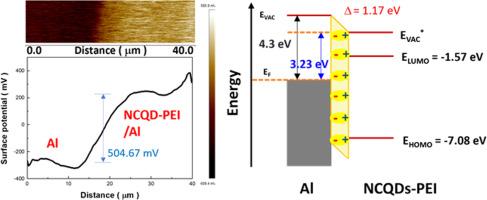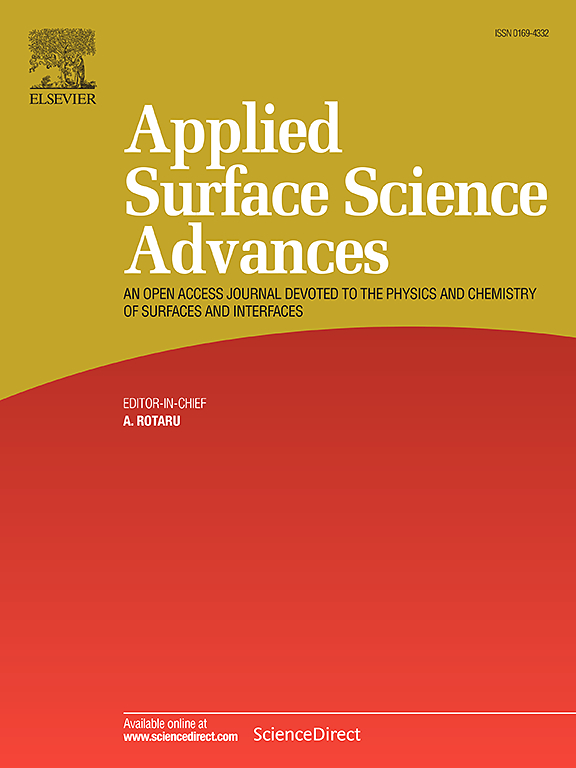Interface dipole evolution from the hybrid coupling between nitrogen-doped carbon quantum dots and polyethylenimine featuring the electron transport thin layer at Al/Si interfaces
IF 7.5
Q1 CHEMISTRY, PHYSICAL
引用次数: 0
Abstract
The assessment of electron transport layer (ETL) for rear-contact engineering of silicon (Si) based optoelectronics has been considered as one of the critical challenges that leverage the performance improvement and device reliability. In this work, the hybrid design of ETL, obtained from the solution-processed nitrogen-doped carbon quantum dots (NCQDs) incorporated with organic polyethylenimine (PEI) demonstrates the feasible contact characteristics for the modification of Si/Al contacts, which greatly facilitates the transport and collection of photoexcited electrons in the Si-based optoelectronics. The aspects of microstructures, functional groups, chemical features, interfacial characteristics and band structures of NCQD/PEI are explicated, visualizing that the evolution of interface dipoles mediated by the overall outcome of physisorption and chemisorption effects, modifies the surface potential difference and results in the explicit reduction of the Al work function from 4.3 eV for pristine Al to 3.23 eV based on the optimized constitutional design (0.10 % NCQD in PEI). These findings are practically employed on the Si-based hybrid solar cells at Si/Al interfaces, fulfilling the conversion-efficiency improvement by 30.9 % compared with reference cells without ETL employment, which are experimentally interpreted by the efficient electron transport across the Si/Al heterojunction and charge collection.

掺氮碳量子点与聚乙烯亚胺之间的混合耦合产生的界面偶极子演化,其特点是铝/硅界面上的电子传输薄层
用于硅基光电子学后接触工程的电子传输层(ETL)评估一直被认为是提高性能和器件可靠性的关键挑战之一。在这项工作中,由溶液加工的氮掺杂碳量子点(NCQDs)与有机聚乙烯亚胺(PEI)混合设计的 ETL 证明了改性硅/铝接触的可行接触特性,这极大地促进了硅基光电子中光激发电子的传输和收集。对 NCQD/PEI 的微观结构、官能团、化学特征、界面特性和能带结构等方面进行了阐述,表明界面偶极子在物理吸附和化学吸附效应总体结果的介导下发生了演变,从而改变了表面电势差,并根据优化的结构设计(0.10 % 的 NCQD 加入 PEI),使 Al 的功函数从原始 Al 的 4.3 eV 明显降低到 3.23 eV。这些发现被实际应用于硅/铝界面上的硅基混合太阳能电池,与未使用 ETL 的参考电池相比,转换效率提高了 30.9%。
本文章由计算机程序翻译,如有差异,请以英文原文为准。
求助全文
约1分钟内获得全文
求助全文

 求助内容:
求助内容: 应助结果提醒方式:
应助结果提醒方式:


